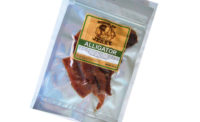There are plenty of sectors of the meat industry that know the advantages and disadvantages of seasonal items. Turkey processors have their Thanksgiving, ham processors their Easter, sausage and burger companies have their summer grilling season. What about corned beef manufacturers? They have the protein of choice for St. Patrick’s Day, but beyond that busy time, they have to find a way to stay as busy and even out the peaks and valleys of their production schedule.
As one of the most recognized names in corned beef, Freirich Foods Inc. has done an excellent job of establishing its presence in the key corned beef markets of New York and the New England areas. Founded in 1921, Freirich has been making corned beef since the 1950s and accounts for an estimated 40 to 50 percent of those markets, says Paul Bardinas, president.
“Corned beef was really what made us a household name in New York,” he says. “As the popularity of St. Patrick’s Day grew over the years, so did we. The only problem with that is it limits you to working for only three months a year. The other nine months, there’s not a whole lot going on.
“What we have tried to work on for the last 10 to 15 years is to look for ways to basically utilize the same equipment that we use to make and package the corned beef and find other avenues where we can expand,” he adds.
Thanks to the company’s flexibility, it has added on new products and new capabilities to balance out that seasonal spike. Other deli products include roast beef and pastrami. Freirich also was one of the first companies to roll out marinated meat products about eight years ago, and that program has taken off. Along with items like marinated steak tips, top rounds and pot roasts, it has expanded into marinated pork items, such as chops and loins.
“We’re in almost all of the Northeast retailers with marinated meats, and I can remember when there weren’t any marinated meats in the case,” Bardinas says. “It’s given us a lot to do here, so we’re busy in the summer as well as around St. Patrick’s Day.”
Bardinas represents the fourth generation of the family to run the business, which started when Julian Freirich emigrated to New York City from Germany. After working in the city’s packing district for a time, he decided to start his own business. His initial product was the Porkette, a value cut of pork that the company has trademarked and manufactures to this day.
His son, Jerry, entered into the business in the 1940s and ‘50s. Armed with a chemistry degree and some of his family’s traditional recipes, he developed many new products and helped grow the business beyond being a local processor. Jerry is retired from the business, but Bardinas says that he calls several times a week to make sure everything is running well.
Jeff Freirich, the third generation, entered into the business in the 1970s. He was Bardinas’ stepfather and oversaw the company’s move from New York to its current home in Salisbury, N.C.
“If you know anything about New York, you know it’s not very easy to expand there,” Bardinas says.
The company was experiencing growth in the 1980s but was unable to grow its facility. After seeing an ad in a trade magazine about a plant for sale in North Carolina, Jerry and Jeff visited Salisbury and found a meat plant and seven acres available for $150,000.
“Coming from New York, where $150,000 couldn’t buy you a shoebox, they jumped at the opportunity,” Bardinas recalls.
Freirich Foods bought the Salisbury facility in 1985 and moved most of its production there, gradually phasing out work at the New York location until certain key older employees had retired. By then, Bardinas had started working in the business as a teenager. After college, he decided to work outside of the meat industry and went back to New York, gaining management experience in several industries. One day, his stepfather called him with an offer to rejoin the family business.
“He had a plant manager who was retiring, and by that point I had plenty of experience in managing,” Bardinas says. “It was good, because I came back to work on my own terms. I never wanted that feeling of nepotism, where I only got the job because my parents owned the company.”
Sustainability Initiatives
Jeff Freirich died in 2007, and Bardinas stepped in as president. Since then, he has kept the company traditions of quality and safe food firmly in place while adding his own stamp on the business. Bardinas and his family live on a farm that has been remodeled to be as energy efficient as possible. He took the same approach to Freirich Foods, making the company more sustainable through energy efficiency, water efficiency and solar power.
“We’ve done recycling programs that pull a lot of the waste stream out of the landfills. A pretty high percentage of what runs through here — our cardboard and plastic — is recycled instead of going to the landfill, which is where it used to go,” he explains. “We’ve had energy audits done here as well, to replace lights, controls and compressors to conserve energy.”
The company also cut its water usage by about 40 percent — a critical achievement, considering the area was suffering from serious drought.
The largest project was to install a solar panel system on the roof of the facility. Fortunately, though the building is 100 years old, the roof was flat and in good condition. While Freirich Foods didn’t have enough roof space to completely offset the amount of energy it uses, its 93kW solar energy system is one of the largest in the area. A graphic on the company’s website offers real-time analytics of the system; at last glance, the company had generated enough energy to offset 17,250 gallons of gasoline and avoided 117 tons of carbon dioxide.
Bardinas said that he had wanted to install such a system for years, but the costs were prohibitive. A combination of state and federal tax credits made it more feasible. In addition, Freirich Foods offers credits for employees who purchase energy-efficient vehicles, and the company installed three charging stations at the facility for those workers.
“I have four small kids, so climate change is important to me,” Bardinas explains. “This is just my way of helping employees get into more efficient vehicles. That’s part of the company’s philosophy, and it seemed like the right thing to do, because there usually is an extra cost to the electric and hybrid vehicles, still.”
While Freirich Foods’ efforts have had a positive impact on the environment, they would not be practical if there wasn’t some sort of economic return for the company. Along with the savings from utility bills, the company also sells its plastic and cardboard, making it a new revenue stream. The solar panel system, once it is paid off, will do the same.
“The system essentially pays for itself in about five years, and after that, you have another 20 years or more of energy production that’s essentially a revenue stream — about $9,000 per year,” Bardinas explains.
The Power of Partnership
Though the company’s efforts to diversify have paid off with steady, year-round work, the first three months of the year are still its peak times, due to the uptick in corned beef demand. In that time, Freirich Foods, which normally employs between 75 and 90 people, can grow up to 150 employees. Many of those temporary workers return year after year, making the training easier to handle.
“A lot of them work in other industries like construction or agriculture, and the winter just happens to be their downtime,” Bardinas says. “So when they’re not doing their normal work, they can come back here and work for 12 weeks.”
As the company looks to expand further west, Bardinas credits several key partners in helping it prosper in new markets. The foodservice sector makes up half of the company’s sales, and Freirich Foods makes everything from fully cooked prime ribs, pot roast and fully cooked corned beef. Partnering with distributors like Sysco and US Foods has strengthened the foodservice business.
Freirich Foods has also worked with Certified Angus Beef for the last seven years, and Bardinas says that the CAB logo on the package has opened many doors in other parts of the country. Freirich Foods even won an award from CAB in 2012 for having the top processor sales increase. One of the company’s newest products is a premium Certified Angus Beef frank. It is currently available as a foodservice item only, but a retail version is in the works.
“Being a regional, small family business, your name counts for a lot in the New York Metro area, but it doesn’t count as much in Florida or Alabama or other parts of the country,” he says. “CAB has been one way that’s allowed us to have more of a national presence, because it’s a nationally recognized brand.”
The company’s relatively small size also makes it a good partner for its retail customers, some of whom have worked with Freirich Foods for 40 years or more. They have come to trust Freirich Foods for not only its quality but also its problem-solving abilities.
“Over the years, you build up a relationship, and they know that they can come to us when they have a new product that they’re interested in and would like to develop,” Bardinas says. “We’re the go-to company to do that, because we are flexible. There isn’t the bureaucracy that you might find in a larger company that might not be interested in something small for a particular retailer. We give them the attention that they want.”









